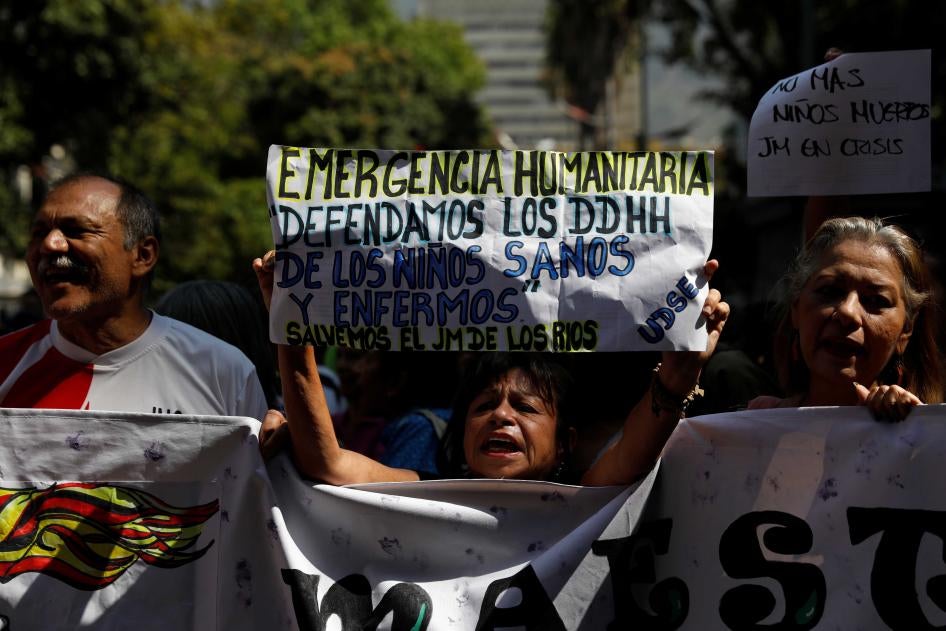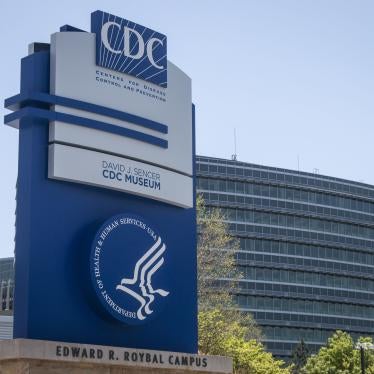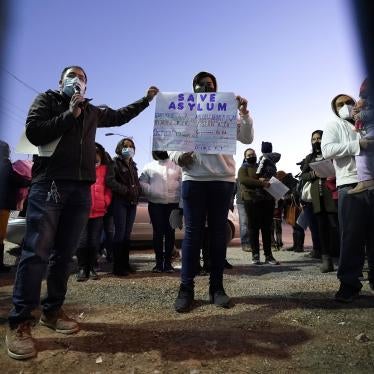As COVID-19 spreads, it’s clearer than ever that millions of Venezuelans who have fled a brutal government crackdown and an already collapsed health system in their home country can’t return safely. The U.S. government has the ability to grant those Venezuelans in the United States Temporary Protected Status (TPS), a type of humanitarian protection that would lift the threat of deportation. And it should make that move now.
TPS may be granted when people can’t return home safely because of generalized, temporary conditions. It’s separate from asylum in U.S. law, which requires each person seeking asylum to establish a well-founded fear of persecution if returned. The U.S. has granted TPS for citizens of ten countries, including El Salvador, Honduras, and Nicaragua, for reasons ranging from hurricanes to civil war.
President Trump’s announcement that his administration would stop issuing some green cards for a period of 60 days in response to COVID-19 isn’t relevant to the question of temporary protection, because TPS only applies to Venezuelans who are inside the United States at the time of the designation.
The TPS criteria certainly applies to Venezuela, particularly in the era of COVID-19, which puts an increased, temporary urgency to this situation. Even before the pandemic emerged, Human Rights Watch research showed that Venezuela was facing a humanitarian emergency, with shortages of food and a health system in utter collapse. We found rising levels of maternal and infant mortality, the spread of vaccine-preventable diseases such as measles and diphtheria, and dramatic surges in infectious diseases including malaria and tuberculosis. Although Venezuelan authorities stopped publishing official data on nutrition years ago, universities and non-governmental organizations have documented high levels of food insecurity and child malnutrition.
The Maduro administration has failed to address the humanitarian crisis, while making heavy-handed attempts to deny and conceal its severity. It has harassed and persecuted health professionals who question the government’s failure to address the crisis and the pandemic. The Maduro administration has also blocked full delivery of desperately needed international aid.
This harassment is part of a much broader pattern of repression. A government crackdown in Venezuela on protesters, critics, and political opponents has led to thousands of arbitrary arrests, prosecution of hundreds of civilians by military courts, torture and other abuses of detainees, extrajudicial killings and short-term enforced disappearances. Abuses and the impunity with which they are committed are ongoing.
As of April 21st, Venezuela had 298 confirmed cases of COVID-19. The real number is probably much higher, given the limited availability of testing and the government’s lack of transparency in providing official epidemiological data. Overcrowding in low-income areas and prisons, as well as the widespread problem of limited access to clean water in hospitals and homes, are a recipe for the rapid spread of COVID-19.
The collapse of the health system and the government’s suppression of public health data undermine Venezuela’s ability to respond to COVID-19. The 2019 Global Health Security Index ranked Venezuela 180 out of 195 countries—and last among Latin American countries—in readiness to respond rapidly to mitigate the spread of an epidemic.
Worldwide, the death rate for COVID-19 has been one to three percent. Health authorities say it’s likely to vary according to the availability of treatment and the overall health of the people it strikes. This bodes ill for Venezuela, where the capacity for complex care is severely limited and where people already suffer malnutrition and a long list of preventable diseases. Venezuela lacks basic X-ray equipment, laboratory tests, ICU beds, and respirators. Without water in outpatient clinics and hospitals, many healthcare providers can’t even wash their hands, which is vital to limiting the spread of COVID-19.
Over a year ago, Human Rights Watch and more than 200 other organizations urged the U.S. government to grant TPS to Venezuelans. The U.S. Department of Homeland Security said then that granting TPS was “discretionary” and that it was “monitoring the situation” in Venezuela.
The Trump administration should grant TPS to Venezuelans without being directed to do so by Congress. But if the administration doesn’t do that promptly, Congress should step in to grant TPS to Venezuelans for the next 18 months. Companion bills have been introduced in the U.S. House and Senate that would do that, but neither has passed the full Congress. The Congressional Budget Office estimated last June that about 200,000 Venezuelan nationals in the U.S. would qualify. As of March, an additional 108,000 Venezuelan asylum seekers had entered the U.S.
Granting TPS to Venezuelans would be an act of mercy in a season of dread. Now is the time to act.
|
Commentary
Now Is Not the Time for the U.S. to Deport Venezuelans
The Trump administration is talking about freezing immigration for 60 days, at a time when it’s urgent to address the vulnerability of thousands of Venezuelans in the United States.
Published in:
Caracas Chronicles
Your tax deductible gift can help stop human rights violations and save lives around the world.
Region / Country
Tags
Most Viewed
-
November 25, 2019
A Dirty Investment

-
April 28, 2025
A Hazard to Human Rights

-
December 7, 2016
“Like Walking Through a Hailstorm”

-
December 19, 2024
Extermination and Acts of Genocide

-
February 19, 2018
“All We Want is Equality”





